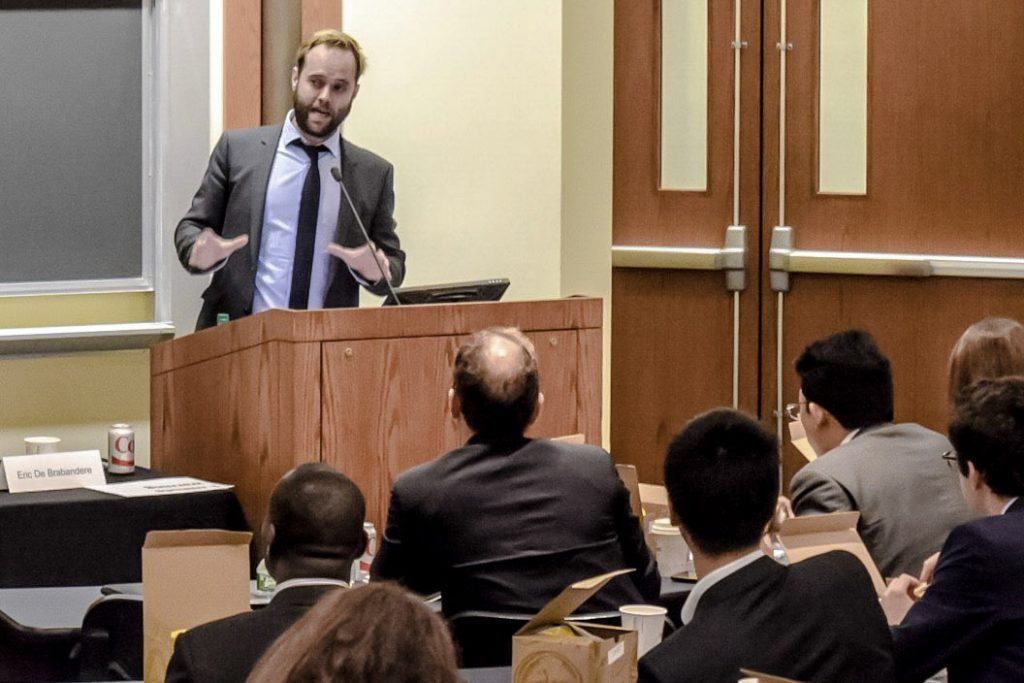As the 21st century has given rise to an international economy and global governance systems, the core policies and baseline structures of international investment law have struggled to adapt. Boston College Law School, in partnership with the Pontifical Catholic University of Chile, hoped to address this challenge and opportunity with a Reforming International Investment Law Conference on October 25.
The daylong conference, which featured more than 20 scholars and experts from 10 countries, addressed current events, theoretical perspectives, and potential dispute settlement reforms in an era of changing trade treaties, global partnerships, and evolving norms in international investment law.
Eric De Brabandere (above), a professor of international dispute settlement law at Leiden University in The Netherlands, was the keynote speaker. Citing his Jesuit high school education and physics background, De Brabandere stressed the need for an evolved system based on calibration, rather than a system focused on balancing. “We’re dealing with different investor rights, obligations, and elements in investment law and arbitration, so it’s not always easy to find a balance,” he said. “Calibration is more appropriate.”
De Brabandere noted that much of the difficulty in international investment reform stems from the broad range of influences involved, with bilateral treaties, regional agreements, and the World Trade Organization all setting different standards. This leads to a system that’s often “focused on protecting investments and promoting capital engagement between two countries,” he stressed. But different perspectives from states that export and host capital “mean it’s not just about promoting capital, but more complex.”
He encouraged leaders in the field to avoid following one broad or narrow approach to investment law, and highlighted hybrid models that have worked in related fields like commercial arbitration, public law, and administrative law.
Any standard “will be influenced by geography, politics, regionalism, and internal state practices,” De Brabandere conceded. “It looks like an anarchist perspective on investment regulation, as if states can do whatever they want.” While acknowledging that diverse expertise and practice will shape reform movements, he argued that three elements that must be present in any new system: more substantive investment law, a focus on human rights and environmental obligations, and greater transparency.
“We’re all in favor of things like transparency, but standard-setting is not as easy as it may seem,” he added. With competing global perspectives, and a need to highlight these three focus areas, De Brabandere returned to the need for calibration, rather than mere balance, among competing stakeholders to ensure legitimacy and fairness going forward.
De Brabandere also sat on a panel chaired by BC Law Professor Frank J. Garcia on “Third Party Funding in Investment Arbitration.” Third party funding (or TPF), a mechanism through which speculative investors can invest in an arbitration claim for a share in the proceeds, has grown dramatically since the global financial crisis after being illegal in most jurisdictions, and raises serious legitimacy challenges to the investment arbitration system.
The panel heard a range of views on TPF, including De Brabandere’s cautions, and those of Leo Gargne, a BC Law LLM candidate from the Sorbonne (one of BC Law’s partner schools), who offered a critical overview of TPF’s shortcomings. Also speaking was William “Rusty” Park of BU, co-chair of a current arbitration industry self-regulation task force on TPF, which recently issued a draft report that was also a subject of this panel.
“The draft report represents a lot of hard work by the task force,” says Garcia, “but in my view it fails to address the key danger posed by TPF. As long as investment rules continue to tilt towards investors and states settle or lose two-thirds of the claims, TPF allows speculative investors to place large, relatively safe bets that will be covered by the losing state’s taxpayers. With awards averaging over $400 million dollars and TPF funders targeting cases against developing countries, it’s an incredibly exploitative system that has to be stopped, not just disclosed. No one wins but the speculators.”
Garcia’s comments and an edited transcript of the panel proceedings were submitted into the task force public comment process.
A video recording of De Brabandere’s keynote address and the proceedings of the TPF panel will soon be available.
The conference was co-chaired by Garcia and Sebastian Lopez Escarcena of Pontifical Catholic University of Chile.



